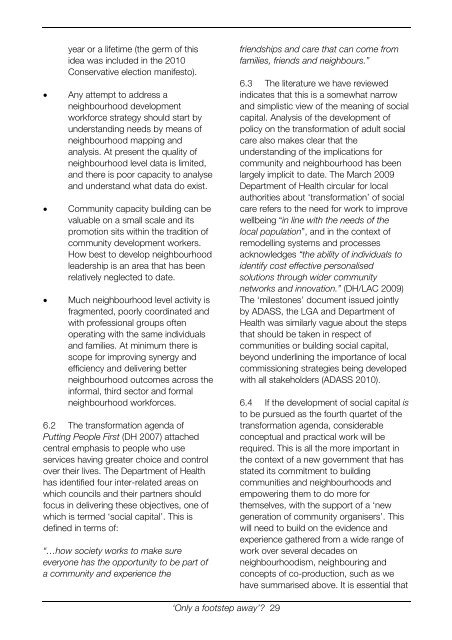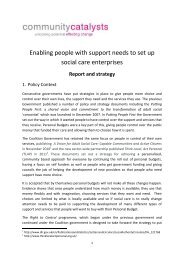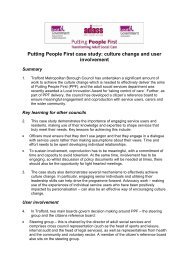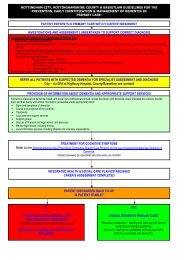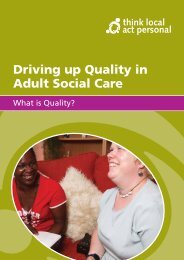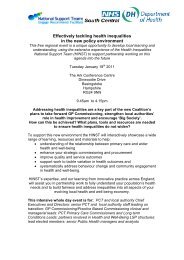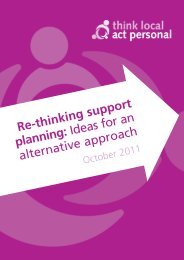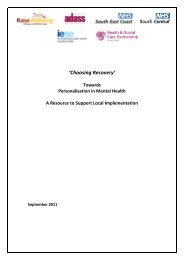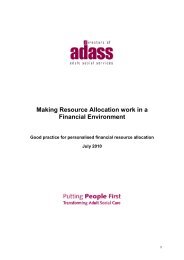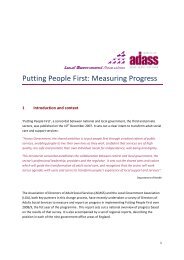'Only a footstep away' - Skills for Care - Think Local Act Personal
'Only a footstep away' - Skills for Care - Think Local Act Personal
'Only a footstep away' - Skills for Care - Think Local Act Personal
- No tags were found...
Create successful ePaper yourself
Turn your PDF publications into a flip-book with our unique Google optimized e-Paper software.
year or a lifetime (the germ of thisidea was included in the 2010Conservative election manifesto).• Any attempt to address aneighbourhood developmentwork<strong>for</strong>ce strategy should start byunderstanding needs by means ofneighbourhood mapping andanalysis. At present the quality ofneighbourhood level data is limited,and there is poor capacity to analyseand understand what data do exist.• Community capacity building can bevaluable on a small scale and itspromotion sits within the tradition ofcommunity development workers.How best to develop neighbourhoodleadership is an area that has beenrelatively neglected to date.• Much neighbourhood level activity isfragmented, poorly coordinated andwith professional groups oftenoperating with the same individualsand families. At minimum there isscope <strong>for</strong> improving synergy andefficiency and delivering betterneighbourhood outcomes across thein<strong>for</strong>mal, third sector and <strong>for</strong>malneighbourhood work<strong>for</strong>ces.6.2 The trans<strong>for</strong>mation agenda ofPutting People First (DH 2007) attachedcentral emphasis to people who useservices having greater choice and controlover their lives. The Department of Healthhas identified four inter-related areas onwhich councils and their partners shouldfocus in delivering these objectives, one ofwhich is termed ‘social capital’. This isdefined in terms of:“…how society works to make sureeveryone has the opportunity to be part ofa community and experience thefriendships and care that can come fromfamilies, friends and neighbours.”6.3 The literature we have reviewedindicates that this is a somewhat narrowand simplistic view of the meaning of socialcapital. Analysis of the development ofpolicy on the trans<strong>for</strong>mation of adult socialcare also makes clear that theunderstanding of the implications <strong>for</strong>community and neighbourhood has beenlargely implicit to date. The March 2009Department of Health circular <strong>for</strong> localauthorities about ‘trans<strong>for</strong>mation’ of socialcare refers to the need <strong>for</strong> work to improvewellbeing “in line with the needs of thelocal population”, and in the context ofremodelling systems and processesacknowledges “the ability of individuals toidentify cost effective personalisedsolutions through wider communitynetworks and innovation.” (DH/LAC 2009)The ‘milestones’ document issued jointlyby ADASS, the LGA and Department ofHealth was similarly vague about the stepsthat should be taken in respect ofcommunities or building social capital,beyond underlining the importance of localcommissioning strategies being developedwith all stakeholders (ADASS 2010).6.4 If the development of social capital isto be pursued as the fourth quartet of thetrans<strong>for</strong>mation agenda, considerableconceptual and practical work will berequired. This is all the more important inthe context of a new government that hasstated its commitment to buildingcommunities and neighbourhoods andempowering them to do more <strong>for</strong>themselves, with the support of a ‘newgeneration of community organisers’. Thiswill need to build on the evidence andexperience gathered from a wide range ofwork over several decades onneighbourhoodism, neighbouring andconcepts of co-production, such as wehave summarised above. It is essential that‘Only a <strong>footstep</strong> away’? 29


